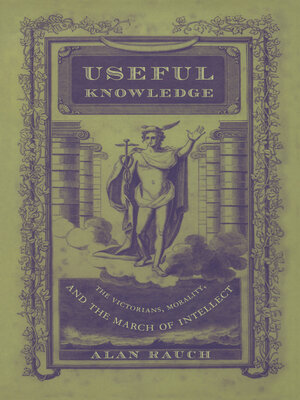
Sign up to save your library
With an OverDrive account, you can save your favorite libraries for at-a-glance information about availability. Find out more about OverDrive accounts.
Find this title in Libby, the library reading app by OverDrive.



Search for a digital library with this title
Title found at these libraries:
| Library Name | Distance |
|---|---|
| Loading... |
Nineteenth-century England witnessed an unprecedented increase in the number of publications and institutions devoted to the creation and the dissemination of knowledge: encyclopedias, scientific periodicals, instruction manuals, scientific societies, children's literature, mechanics' institutes, museums of natural history, and lending libraries. In Useful Knowledge Alan Rauch presents a social, cultural, and literary history of this new knowledge industry and traces its relationships within nineteenth-century literature, ending with its eventual confrontation with Charles Darwin's Origin of Species.
Rauch discusses both the influence and the ideology of knowledge in terms of how it affected nineteenth-century anxieties about moral responsibility and religious beliefs. Drawing on a wide array of literary, scientific, and popular works of the period, the book focusses on the growing importance of scientific knowledge and its impact on Victorian culture. From discussions of Jane Webb Loudon's The Mummy! and Mary Shelley's Frankenstein, to Charlotte Brontë's The Professor, Charles Kingsley's Alton Locke, and George Eliot's Mill on the Floss, Rauch paints a fascinating picture of nineteenth-century culture and addresses issues related to the proliferation of knowledge and the moral issues of this time period. Useful Knowledge touches on social and cultural anxieties that offer both historical and contemporary insights on our ongoing preoccupation with knowledge.
Useful Knowledge will appeal to readers interested in nineteenth century history, literature, culture, the mediation of knowledge, and the history of science.
Rauch discusses both the influence and the ideology of knowledge in terms of how it affected nineteenth-century anxieties about moral responsibility and religious beliefs. Drawing on a wide array of literary, scientific, and popular works of the period, the book focusses on the growing importance of scientific knowledge and its impact on Victorian culture. From discussions of Jane Webb Loudon's The Mummy! and Mary Shelley's Frankenstein, to Charlotte Brontë's The Professor, Charles Kingsley's Alton Locke, and George Eliot's Mill on the Floss, Rauch paints a fascinating picture of nineteenth-century culture and addresses issues related to the proliferation of knowledge and the moral issues of this time period. Useful Knowledge touches on social and cultural anxieties that offer both historical and contemporary insights on our ongoing preoccupation with knowledge.
Useful Knowledge will appeal to readers interested in nineteenth century history, literature, culture, the mediation of knowledge, and the history of science.







